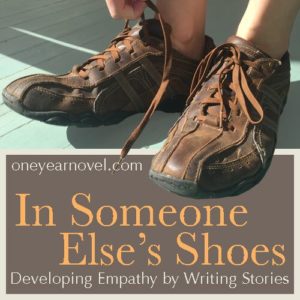In Someone Else’s Shoes – Developing Empathy by Writing Stories
Rebecca Harrison, Guest Contributor
We asked Rebecca to be one of our student speakers at the 2015 Summer Workshop. The challenge she made to her fellow writers was moving; we asked her for a blog version we could share with all of you!
Rebecca:
I have always loved stories.
Most of my childhood memories involve toting around a book, or writing down my own stories on colored craft paper. I’m artistic and creative in general, but there’s something about stories that touches me in a way no other medium of art can. Because stories have characters.
As a kid, I related to fictional characters more than I did to real people (and still often do). I was always playing characters in my head, stepping into their shoes, becoming them for just a little while, because somehow they helped me make sense of myself and of the world around me. Whenever I was in a scary situation, I would step into the shoes of a favorite character who was brave, and that taught me to be brave myself.
(Obi-Wan Kenobi is a great teacher.)
But fictional characters didn’t only help me understand myself—they helped me to understand those around me, too. I am a very socially awkward person, and when I was a kid I was extremely shy. EXTREMELY shy. I’m still a little shy now (part of that is just being introverted and—let’s face it, really really awkward), but when I was a kid I couldn’t figure people out and I felt like I lived in an alien world—or that maybe I was the alien. Probably that.
Then I started writing. I began to develop original characters—characters who weren’t much like me, who saw the world differently, who faced challenges I had never come close to. And the more I wrote, the more I became convinced of something really cool:
Writers have an amazing and, I believe, unique opportunity to relate to and understand those around us.
On a daily basis, we insert ourselves into the shoes of complete strangers, learning who they are, where they come from, why they do what they do. We put days, sometimes weeks or more, into developing characters—but rather than a creative process, it feels like a discovery. We unearth who these people are as we watch them interact with their world. As we dig up their backstories, we get to know why they do what they do.
And as we get to know our characters more deeply, the more we connect with and care for them. When we write and when we read, and when we watch movies, we connect with characters: their struggles, their insecurities, their dreams, and their victories, because, even if it’s just on one small level, we understand what it’s like to feel disappointed, or hopeful, discouraged, or encouraged. And we discover that we, too, are understood.
I am reading a great book called Wired for Story by Lisa Cron, which discusses a lot of the same kinds of things Jeff Gerke talked about at the Summer Workshop—the psychology behind storytelling. The book contains a quote by cognitive psychologist and author Keith Oatley:
In literature we feel the pain of the downtrodden, the anguish of defeat, or the joy of victory—but in a safe space. …We can refine our human capacities of emotional understanding. We can hone our ability to feel with other people who, in ordinary life, might seem too foreign—or too threatening—to elicit our sympathies. Perhaps then when we return to our real lives, we can better understand why people act the way they do.
Writing stories is a portal—or, a wardrobe if you will—to experiencing someone else’s life. It is the closest we will ever get to catch glimpses of unspoken thoughts and feelings that seem so masked in the real world. We wear so many masks here. They cause us to skip asking the “why”—or even worse, to make up our own “why” for people’s actions.
Writing gives a voice to what is silent. Or ignored.
I think we all have a tendency to expect and assume the worst about others. We assume he’s running late because he’s a lazy bum, when in reality he stayed up until 2:00 in the morning helping a friend. We assume she talks too much because she likes to hog attention, but in reality she’s afraid of being invisible. That assume-the-worst mentality gives wheels to cynicism, breeds distrust and contempt in our friendships, communities, and in our own hearts. That cynicism is the filter through which we see the world—and others around us.
But if anyone should understand that not everything is as it seems, it would be us. It would be the writers. Because we have the gift of perspective.
We have the gift of recognizing that, just like our characters, we all have strengths and weaknesses, fears and hopes. Even heroes have fatal flaws and experience failure. We are all trying to figure out this big, big world and we will experience Inciting Incidents, Black Moments, Showdowns, and Victories. And we won’t always get it right. But we don’t have to always get it right.
We have the gift of knowing that everyone has a backstory—that everyone comes from a different place, shaped by different circumstances. We understand that things and people change and we understand that where we’ve been doesn’t determine where we’ll end up.
And lastly, we have the gift of knowing we are all part of a much bigger story that isn’t limited by our minuscule perspective. It’s so easy to get lost in us—It’s so easy to think of ourselves as the hero of our own story. But something that I have learned during my 23 years on this planet, is that many of the heroes in my life, who are responsible for nudging me towards minor adjustments—or complete 180s… I don’t even know some of their names.
They were heroes because they took the effort to understand me. Not because they “rescued” me, but because they helped me realize I wasn’t as alone as I thought I was.
What I guess I am encouraging you all to realize is how wonderful a position you are in to make a difference. To understand, to be understood—and to do something with that understanding. To be a different kind of hero. Just like when we give “gifts” to our heroes—magic swords and special talents—we have been given a gift too.
Now go use it.
…

About Rebecca
Rebecca Harrison is an aspiring writer and graphic artist who first joined The One Year Adventure Novel in fall of 2008, when she discovered her passion for storytelling. She is a crazy cat lady in training and while long walks on the beach aren’t her thing, she does enjoy some hot tea and spending quality time reading with her dragon, Spire.
Read another post by Rebecca, “How to Write Evil, Awesome Villains” »



Thank you for the insights, Rebecca. I can’t even pinpoint one specific thing- it was another after another. The whole post is filled up with…well, awesomeness *nodnod*